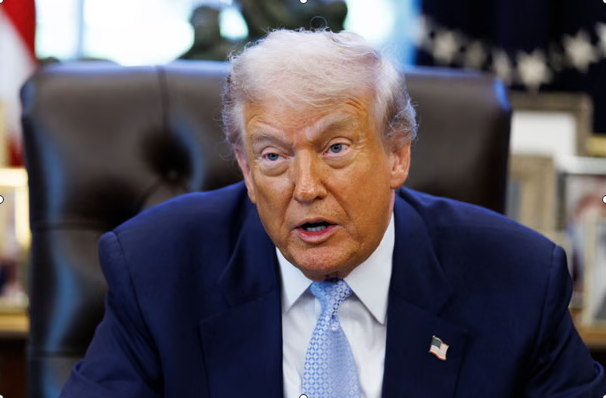On Wednesday, Donald Trump enacted a law instructing the justice department to disclose records from the inquiry into the deceased sex offender Jeffrey Epstein, yielding to combined pressure from Democratic adversaries and his own conservative supporters.
This act represented a significant turnaround for Trump, who previously had the power as president to unilaterally release the records but opted not to do so.
Democrats have reveled in the debate surrounding the documents and the chance that they may reveal damaging details about Trump, who had a personal connection with Epstein, who passed away in 2019 while awaiting trial on charges of sex trafficking.
Following the signing of the legislation, Trump aimed to change the narrative in a post on Truth Social, highlighting Epstein’s connections to the Democratic party.
“Maybe the truth regarding these Democrats and their links to Jeffrey Epstein will soon come to light, because I HAVE JUST SIGNED THE BILL TO RELEASE THE EPSTEIN FILES!” Trump stated on Wednesday evening.
The justice department is required to make all documents related to Epstein available within 30 days, including those concerning the investigation into his death by suicide in a federal prison cell. While the legislation allows for the redaction of identifying details of victims, it specifically prohibits officials from withholding information due to fears of “embarrassment, reputational damage, or political sensitivity.”
Trump vacillated on this matter for several years before ultimately succumbing to political pressure. During his campaign, he committed to making the Epstein documents public. After taking office, however, he shifted his stance, dismissing the issue as a “hoax” and criticizing those advocating for the documents’ release.
Nonetheless, he changed his position in the past few days, realizing that the House of Representatives was likely to pass the legislation, asserting “we have nothing to hide” and that “it’s time to move on from this Democrat Hoax crafted by Radical Left Lunatics to distract from the Great Success of the Republican Party, including our recent Victory on the Democrat ‘Shutdown’.”
Following Trump’s expression of support for the legislation, Republican dissenters quickly advanced it through both the House and the Senate. Mike Johnson, the Speaker of the U.S. House, had delayed the bill for several months, and after its passage in the House, he expressed a desire for amendments in the Senate, which did not occur.
Earlier this year, the Justice Department stated that it had disclosed all documents related to Epstein that it was able to without compromising ongoing investigations or disclosing details about his victims.
“A significant amount of this information is subject to a court-imposed seal,” noted a Justice Department memo from July. “A small portion of this information would have been publicly revealed had Epstein faced trial, as the sealing was solely to safeguard victims and did not expose any further individuals to allegations of criminal behavior.”
It remains uncertain what the department will disclose as a result of the new legislation – the law outlines numerous potential items for release while allowing exemptions for certain types of materials.
The legislation mandates that the Attorney General make unclassified documents pertaining to Epstein accessible to the public “in a format that is searchable and downloadable,” which encompasses all investigations involving Epstein, his associate Ghislaine Maxwell, flight logs and travel records, individuals referenced in connection to his offenses, organizations linked to his trafficking or financial networks, immunity agreements and other plea deals, internal communications regarding prosecution decisions, records of his incarceration and death, along with information about any deletions of files.
The department is required to provide the documents within a span of 30 days. The legislation includes exceptions such as the redaction of any personal identifying details of victims, any images depicting child sexual abuse, releases that could disrupt ongoing investigations or legal actions, and any representations of death or maltreatment.
Congressional members disclosed tens of thousands of documents that reemphasized the connections Epstein had with various prominent individuals, such as Larry Summers, a former Treasury Secretary, and Michael Wolff, a writer and biographer of Trump.
Trump and Epstein were once acquaintances, and some documents released by Congress members thus far include Trump’s name; however, this does not imply his involvement in any criminal activities associated with Epstein.
Documents shared by Democratic representatives of the House oversight committee featured an email from Epstein to Wolff wherein Epstein remarked about Trump: “Of course, he knew about the girls as he asked Ghislaine to stop.” In another correspondence, he referred to Trump as the “dog that hasn’t barked.”
Epstein frequently communicated about Trump via email, often in a disparaging manner. “I have encountered some truly terrible people,” he noted in one email, “but none as bad as Trump. He has not a single decent cell in his body.”
